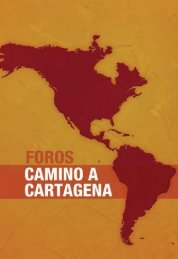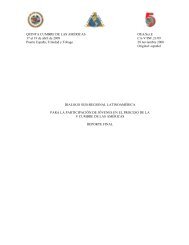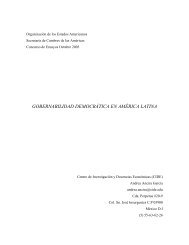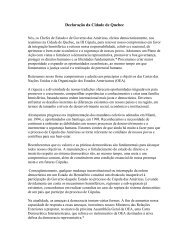The Road to Hemispheric Cooperation: Beyond the Cartagena
The Road to Hemispheric Cooperation: Beyond the Cartagena
The Road to Hemispheric Cooperation: Beyond the Cartagena
Create successful ePaper yourself
Turn your PDF publications into a flip-book with our unique Google optimized e-Paper software.
EDuCATION IN THE AMERICAS: WHAT THE<br />
SuMMIT MISSED<br />
Jeffrey M. Puryear* I Vice President for social policy at <strong>the</strong> Inter-American Dialogue and Co-Direc<strong>to</strong>r of <strong>the</strong> Partnership<br />
for Educational Revitalization in <strong>the</strong> Americas (PREAL)<br />
Tamara Ortega Goodspeed* I Senior Associate at <strong>the</strong> Inter-American Dialogue<br />
Executive Summary<br />
●● <strong>The</strong> Sixth Summit of <strong>the</strong> Americas gave little attention <strong>to</strong><br />
<strong>the</strong> urgent need <strong>to</strong> improve education quality and equity,<br />
although both are vital <strong>to</strong> <strong>the</strong> region’s development and<br />
competitiveness.<br />
●● Student learning in Latin America is lacking, despite increased<br />
spending and improved enrollments.<br />
●● Lack of effective teaching and management systems contributes<br />
<strong>to</strong> low levels of learning, as do political obstacles<br />
and weak demand for change.<br />
●● By making learning <strong>the</strong> center of education policy, focusing<br />
on systemic changes—including all aspects of teacher<br />
policy—and streng<strong>the</strong>ning <strong>the</strong> demand for quality education,<br />
countries would help ensure students acquire <strong>the</strong><br />
skills <strong>the</strong>y need <strong>to</strong> succeed in <strong>to</strong>day’s world.<br />
●● Clear, measurable, region-wide commitments <strong>to</strong> learning<br />
(such as ensuring all children leaving <strong>the</strong> third grade can<br />
read) would be a good first step.<br />
<strong>The</strong> Context<br />
Few dispute <strong>the</strong> central role of education in improving<br />
economic growth and competitiveness, reinforcing democracy,<br />
and helping <strong>the</strong> poor. Highly skilled individuals<br />
earn more, are more likely <strong>to</strong> engage in civic activities,<br />
live healthier lives, and compete more successfully in a<br />
global economy that trades in knowledge and services.<br />
Moreover, in a region plagued by one of <strong>the</strong> world’s highest<br />
rates of inequality, education can help reduce wage<br />
differentials and promote equality. Research also suggests<br />
that education can reduce incidence of crime. One<br />
study, for example, found that a one-year increase in<br />
average years of schooling reduced both property and<br />
violent crime by 11 <strong>to</strong> 12 percent. 1 Education is also intimately<br />
linked <strong>to</strong> efforts <strong>to</strong> reduce child labor. In short,<br />
education is a fundamental human right that contributes<br />
<strong>to</strong> many areas of development.<br />
So we were disappointed that <strong>the</strong> Sixth Summit of <strong>the</strong><br />
Americas in <strong>Cartagena</strong>, Colombia, in April 2012 paid so<br />
little attention <strong>to</strong> <strong>the</strong> urgent need <strong>to</strong> improve education.<br />
To be sure, a busy agenda covering contentious issues<br />
such as drug policy and Cuba’s participation in <strong>the</strong> inter-<br />
American process made it difficult <strong>to</strong> discuss everything,<br />
and getting those issues on <strong>the</strong> table was important.<br />
However, education’s intersection with so many summit<br />
<strong>to</strong>pics, as well as a shared conviction that schools are<br />
not doing enough, should have made it relatively easy<br />
<strong>to</strong> agree on two or three concrete action items that might<br />
move <strong>the</strong> region forward. <strong>The</strong> summit could have and<br />
should have (and in <strong>the</strong> past has) produced more than<br />
President San<strong>to</strong>s’s statement that countries “agreed <strong>to</strong><br />
promote education, share educational materials, and empower<br />
each student in <strong>the</strong>ir education and in overcoming<br />
social and economic barriers.” 2<br />
* Jeffrey M. Puryear is vice president for social policy at <strong>the</strong> Inter-American Dialogue and co-direc<strong>to</strong>r of <strong>the</strong> Partnership for Educational<br />
Revitalization in <strong>the</strong> Americas (PREAL). Tamara Ortega Goodspeed is a senior associate at <strong>the</strong> Inter-American Dialogue, where she<br />
manages <strong>the</strong> national and regional report card efforts for PREAL. Data and analysis in this paper draw heavily from PREAL’s forthcoming<br />
report card on education in Latin America. <strong>The</strong> authors would like <strong>to</strong> thank Katie Hufnagel, Ka<strong>the</strong>rina Hruskovec, Mariellen Malloy<br />
Jewers, Scott Odell and Alexandra Solano for <strong>the</strong>ir invaluable research assistance.<br />
<strong>The</strong> <strong>Road</strong> <strong>to</strong> <strong>Hemispheric</strong> <strong>Cooperation</strong>: <strong>Beyond</strong> <strong>the</strong> <strong>Cartagena</strong> Summit of <strong>the</strong> Americas<br />
<strong>The</strong> Brookings Institution ❘ Latin America Initiative<br />
31








